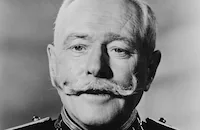The Golden Blade

Brief Synopsis
Cast & Crew
Nathan Juran
Rock Hudson
Piper Laurie
Gene Evans
George Macready
Kathleen Hughes
Film Details
Technical Specs

Synopsis
In the desert, a battle rages between the cities of Basra and Bagdad, during which Basranian Harun's father is wounded. Before he dies, Harun's father gives him a medallion he has pulled from his killer's neck, and urges him to put an end to the fighting. Harun travels to Bagdad, where he spies beautiful Khairuzan trying to sell clothes to flinty shopkeeper Barcus. To help her, Harun buys the clothes, and also finds a gold sword in the back of the shop. Soon after, a rabble-rouser accuses Basra's citizens of starting the fighting, and when Khairuzan defends Basra, a riot breaks out. Barcus watches in awe as Harun cuts the other men's swords in half with his. As soon as soldiers appear and spirit Khairuzan away, the fight stops, and Harun finds a medallion identical to his own on the ground. In the shop, Barcus tries to demonstrate the sword's power, but it will cut through iron only when Harun wields it. Barcus, sure that the sword correlates to a legend, attempts to read its two inscriptions. Unable to do so, he warns Harun that all swords have two sides, and until they can discover all its powers he must be very careful. Meanwhile, cunning vizier Jafar advises Badgad's Caliph to fight Basra, but the Caliph refuses. Khairuzan, who is his daughter, is soon brought in by her guard, Jafar's brawny son Hadi. Jafar convinces the Caliph that Khairuzan's headstrong ways may be tamed by marriage to his son, then later plots with Hadi to undermine the Caliph by inciting more battles against Basra. When Khairuzan learns of her marital fate, she escapes the palace disguised as a boy. Harun is waiting outside for an audience with Jafar, and when the guards spot Khairuzan, she steals Harun's horse. She is finally caught by both Hadi and Harun, who begin a fight, which Harun wins when the magic sword protects him from Hadi's cuts. Khairuzan claims to be a boy slave and Harun brings her to the city, where she eavesdrops as Barcus reveals that the sword's first inscription promises that whoever unsheathes the sword will gain the throne. Later, Harun, realizing that Khairuzan is a girl, protects her when a guard questions them, and they are both jailed. In the prison, they kiss, but then quickly begin to quarrel. After being released to her father, she declares that only the winner of a joust will claim her hand. She names Harun as her guard, and although he is infuriated to discover she is a princess and he her servant, he later watches admiringly as she provides alms to the poor townspeople. Meanwhile, Khairuzan's handmaiden, Bakhamra, informs Hadi about the magic sword, and he and his father steal it by creating a replica and then drugging Harun in order to switch the two. Khairuzan wakes Harun from his stupor and later asks him why he has not signed up for the joust. When she disagrees with his response that he is not aristocratic enough to marry her, he kisses her. He then races to Barcus to proclaim his newfound joy, and refuses to listen when Barcus warns him that the second inscription counsels that the bearer's true reward will arrive in a grave of stone. At the joust, Hadi, who cannot cut metal with the sword, tampers with Harun's saddle. Quickly, all but Hadi and Harun are eliminated from the contest, and Hadi finally wins by throwing Harun from his saddle. Harun realizes his swords were switched and suspects Khairuzan. He breaks into the palace and finds Bakhamra, who has just been jilted by Hadi and so reveals his scheme to Harun. Harun locates Hadi just as he is about to bring his unwilling bride to bed, and fights with him. He is captured by Hadi's guards brought before Jafar, where Bakhamra and the Caliph overhear the vizier plan to kill them and blame Harun. When the Caliph orders Jafar arrested, the vizier brings out his medallion, which is the same as the one Harun carries, and tries to kill the Caliph with the magic sword, but it slices into a stone pillar and remains stuck there. The guards kill the Caliph, then Harun and Khairuzan escape by fooling the guards into believing they have died. Back at the palace, Jafar and Hadi soon discover that they cannot pull the sword from the column and call men in from across Bagdad to attempt to pull it out. While Khairuzan gathers the townspeople around her, Harun and Barcus sneak back into the palace. Harun fights with the guards and is almost captured when Khairuzan arrives with her army. He grabs the sword from the pillar, causing it to collapse on top of Jafar and Hadi. With Bagdad's true enemies killed, Khairuzan pronounces Harun a hero, and they kiss as the townspeople cheer.

Director
Nathan Juran
Cast

Rock Hudson

Piper Laurie

Gene Evans

George Macready

Kathleen Hughes

Steven Geray
Edgar Barrier
Alice Kelley

Anita Ekberg
Renate Hoy
Erika Nordin
Valerie Jackson
Victor Romito
Jack Baston
Harry Wilson
Olga Lunick
Dorinda Clifton

Dennis Weaver
Guy Williams
Dayton Lummis
Bill Radovich
Harry Mendoza
Fred Graham
Harry Lang
Sydney Mason
Paul Martin
Robert Terhune
Jack Wilson
Ramsay Hill
Julian Upton
Mickey Simpson
Zachary Yaconelli
Charles Horvath
Roy Engel
Fred Berest
Tamara Linch
George "shorty" Chirello
Virginia Eiler

Merrill Mccormick
Wally Walker
Mike Portanova
Jennings Miles
Jimmy Dime
Fred Carson
Martin Cichy
Crew
Gene Anderson
Phil Bowles
Leslie I. Carey
Ralph Faulkner
Bob Forrest
William Fritzsche
Russell A. Gausman
Joseph Gershenson
Maury Gertsman
Leonard Goldstein
Sidney Gottlieb
Julia Heron
Bernard Herzbrun
William Holland
Corson Jowett
Ted J. Kent
Eugene Loring
Jay A. Morley Jr.
Terry Nelson
Eric Orbom
John Rich
Joan St. Oegger
Bud Westmore
Richard Wilson

Film Details
Technical Specs

Articles
The Golden Blade -
Directed by Nathan Juran from a script and original story by John Rich, The Golden Blade was advertised luridly by the Universal marketing department with slogans like, "Out of Bagdad's mystic past thunders the adventure of all the ages!" and "His blade of gold...a legend in battle! Her kiss of surrender...the prize of victory!" Also known as The Sword of Damascus, the film was shot from mid-November to mid-December 1952 on the Universal back lot in North Hollywood. Farley Granger, then under suspension from the Samuel Goldwyn company, had been the first choice for Harun, but Granger refused to play the role and it was given to Hudson. Piper Laurie was a starlet at Universal and suffering through unsatisfying parts when she was cast as Khairuzan.
In her autobiography, Learning to Live Out Loud, she wrote of being asked to perform a dance in the film, which she happily accepted. Universal hired the famed choreographer Eugene Loring, who worked for several months with Laurie on her dance. Loring kept her to a grueling schedule of eight hours of rehearsal a day, which Piper Laurie didn't mind, because "besides keeping my weight down, working hard at anything made me feel more comfortable with the privileges I had. Eugene demanded that I eat a steak for breakfast every morning before I left the house. That seemed impossible because my breakfast was usually black coffee and a cigarette." In the morning, Loring had Laurie do stretches and strength training, and in the afternoon "modern dance movements that I repeated and repeated until I collapsed to the floor." After all those months of rehearsal, the dance number was filmed in one day. However, when Laurie saw the final edit of The Golden Blade months later, she was shocked to find that most of the dance had been reshot with a professional dancer. "They must have gone to some pains to make sure I wasn't on the lot when they shot it. I suppose if I hadn't been so numb emotionally, I would have been angrier, but I never thought my efforts had been wasted. [...] I didn't like the deception, of course, but somehow it didn't surprise me."
Hudson and Laurie had first met when she was being tested by Universal in order to secure a contract. They later became friends when they worked together on Has Anybody Seen My Gal (1952) and often hung out together. Laurie said that Hudson never made a pass at her, and that at the time she was unaware of his sexual orientation. The studio manufactured a fictitious romance between the two for the benefit of the newspapers and fan magazines, a common practice in the Golden Age of Hollywood in order to both promote the films and their stars, and often to hide the fact that one or both of the stars were gay, as in Hudson's case. After the film was completed, Laurie was asked to "write" a profile of Hudson for Modern Screen in which she described him as "the nicest person to have around because he's so much fun. [...] I've seen him in a serious mood only a couple of times, and both of them concerned his work. He's quite sober about it, and when we sat in a projection room to watch a rough cut of The Golden Blade, he began hacking himself to pieces with his criticism." Most fan magazine articles supposedly written by stars were ghostwritten by either the staff of the magazines or the studio publicists. To help further promote the film, Piper Laurie would appear as one of the surprise guests when Rock Hudson was profiled on the 12th episode of the first season of Ralph Edwards' famed This Is Your Life television program in 1952.
When it was released in September 1953, The Golden Blade received generally favorable notices. Modern Screen said the film had "enough plots and counterplots to make you dizzy - but not bored."
By Lorraine LoBianco

The Golden Blade -
Quotes
Trivia
Notes
The working title of this film was The Sword of Damascus. According to an October 1952 Los Angeles Times article, Universal originally sought to borrow Farley Granger, who had been suspended from Samuel Goldwyn, for the role of "Harun." The November 14, 1952 Hollywood Reporter production chart credits Emrich Nicholson as art director, but he was apparently replaced by Eric Orbom; the extent of Nicholson's contribution to the final film is not known. A November 1952 Hollywood Reporter news item lists real-life wrestlers Sammy Stein, Chester Hayes, Vic Holbrook, Hans Schnabel and Tom Rinestro as wrestlers in the film, but the viewed version contained no wrestling scenes, and their appearance in the final film has not been confirmed.

Miscellaneous Notes
Released in United States Summer August 1953
Released in United States Summer August 1953













